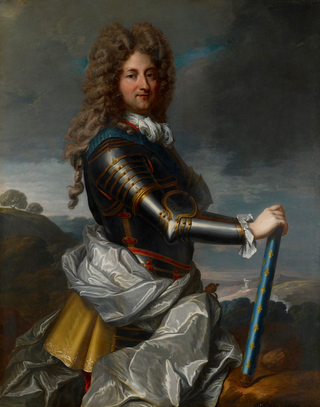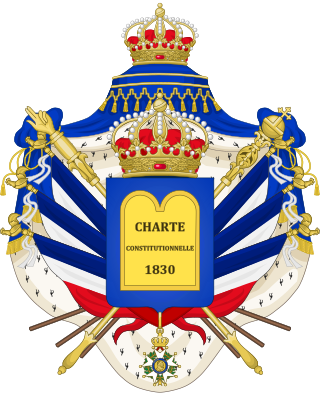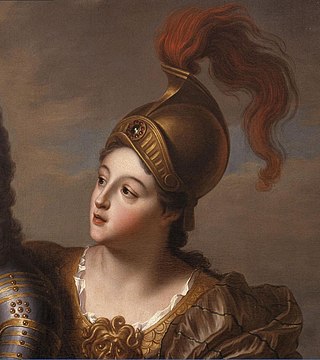| |||||
| Decades: | |||||
|---|---|---|---|---|---|
| See also: | Other events of 1723 History of France • Timeline • Years | ||||
Events from the year 1723 in France
| |||||
| Decades: | |||||
|---|---|---|---|---|---|
| See also: | Other events of 1723 History of France • Timeline • Years | ||||
Events from the year 1723 in France

The 1720s decade ran from January 1, 1720, to December 31, 1729.

1723 (MDCCXXIII) was a common year starting on Friday of the Gregorian calendar and a common year starting on Tuesday of the Julian calendar, the 1723rd year of the Common Era (CE) and Anno Domini (AD) designations, the 723rd year of the 2nd millennium, the 23rd year of the 18th century, and the 4th year of the 1720s decade. As of the start of 1723, the Gregorian calendar was 11 days ahead of the Julian calendar, which remained in localized use until 1923.

The House of Bourbon is a European dynasty of French origin, a branch of the Capetian dynasty, the royal House of France. Bourbon kings first ruled France and Navarre in the 16th century. By the 18th century, members of the Spanish Bourbon dynasty held thrones in Spain, Naples, Sicily, and Parma. Spain and Luxembourg have monarchs of the House of Bourbon.

Philippe II, Duke of Orléans, was a French prince, soldier, and statesman who served as Regent of the Kingdom of France from 1715 to 1723. He is referred to in French as le Régent. He was the son of Monsieur Philippe I, Duke of Orleans, and Madame Elisabeth Charlotte, Duchess of Orleans. Born at his father's palace at Saint-Cloud, he was known from birth by the title of Duke of Chartres.

Guillaume Dubois was a French cardinal and statesman.

Louis, Duke of Orléans was a member of the House of Bourbon, and as such was a prince du sang. At his father's death, he became the First Prince of the Blood and Duke of Orléans. Known as Louis le Pieux and also as Louis le Génovéfain, Louis was a pious, charitable and cultured prince, who took very little part in the politics of the time.

The Régence was the period in French history between 1715 and 1723 when King Louis XV was considered a minor and the country was instead governed by Philippe d'Orléans as prince regent.

Louis François de Bourbon, or Louis François I, Prince of Conti, was a French nobleman who became the Prince of Conti from 1727 to his death, succeeding his father, Louis Armand II de Bourbon. His mother was Louise Élisabeth de Bourbon, the daughter of Louis III, Prince of Condé and Louise Françoise de Bourbon, a legitimized daughter of King Louis XIV of France. His younger sister, Louise Henriette de Bourbon, was the mother of Philippe Égalité. As a member of the reigning House of Bourbon, he was a Prince du Sang.

Louis Henri, Duke of Bourbon, was a French nobleman and politician who served as Prime Minister of France from 1723 to 1726. As a member of the reigning House of Bourbon, he was a prince du sang.
Duke of Nemours was a title in the Peerage of France. The name refers to Nemours in the Île-de-France region of north-central France.

The 4th House of Orléans, sometimes called the House of Bourbon-Orléans to distinguish it, is the fourth holder of a surname previously used by several branches of the Royal House of France, all descended in the legitimate male line from the dynasty's founder, Hugh Capet. The house was founded by Philippe I, Duke of Orléans, younger son of Louis XIII and younger brother of Louis XIV, the "Sun King".
The Cellamare conspiracy of 1718 was a conspiracy against the Regent of France, Philippe d'Orléans (1674–1723) that aimed to depose him of his position and place Philip V, then King of Spain, as the new regent of France. Concocted in Spain, the plot was the brainchild of Antonio del Giudice, Prince of Cellamare.

Jean Philippe, bâtard d'Orléans, called le chevalier d'Orléans or le Grand Prieur d'Orléans, was an illegitimate son of Philippe d'Orléans, nephew and son-in-law of Louis XIV.
Events from the year 1674 in France.
Events from the year 1722 in France
Events from the year 1717 in France
Events from the year 1738 in France

Marie Madeleine de La Vieuville, Marquise of Parabère (1693-1755), was a French aristocrat. She was the official mistress of Philippe II, Duke of Orléans, during his tenure as regent of France during the minority of the infant King Louis XV of France. That role made her a well known public figure during the French regency years (1715-1723).
Louise-Charlotte de Foix-Rabat, comtesse de Sabran (1693–1768), was a French aristocrat. She was the official mistress of the Philippe II, Duke of Orléans, who was the regent of France during the minority of the infant King Louis XV of France.
Marie-Thérèse Blonel de Phalaris (1697–1782), was a French aristocrat. She was the official mistress of Philippe II, Duke of Orléans, who was the regent of France during the minority of the infant King Louis XV of France. She was the mistress of the regent between 1720 and 1723.